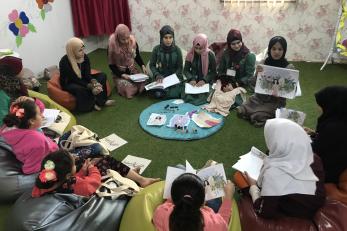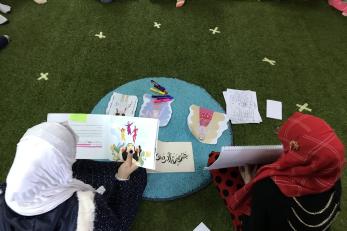For Syrian girls, threat to education overshadows coronavirus

It has been two months since We’am, a 17 year old living in Za’atari Camp, has seen her classmates or walked to school with her friends.
“We have not left the house for weeks now,” she says, clearly upset. She knows the seriousness of the situation. We’am lives in a caravan with her eight siblings and parents. “We are all committed to staying home under this curfew,” she told us.
Under curfew, We’am’s world — dusty camp roads, tightly clustered caravans, her school and a small market — is shrinking. Her opportunities for education and work may be as well.
COVID and the threat to education
Za’atari, the largest refugee camp in the region, is home to nearly 77,000 people, including over 6,000 Syrian girls navigating adolescence. Due to Jordan’s quick actions, there have been no cases of COVID-19 so far in the camp, but fear of the virus spreading in such close quarters is still high.
Teens understand the threat, but their world is dominated by their education and friendships that have helped them rebuild their lives since they fled Syria’s war. “Our whole lives have changed. We used to go to school, the study center, and Dreamland [the Mercy Corps center]...but now we cannot go out at all or see any of our friends.” Raw’a, 17, told us.
Syrian adolescents have high aspirations for their education, particularly girls, as many see it as a lifeline to a better future. Although caregivers largely share similar aspirations in theory, real life challenges can quickly derail educational opportunities. Concerns about safety, financial burden and child marriage becomes even more pronounced in times of crisis. While these girls have had the opportunity to attend school, they know it’s fragile and they are holding on tight.
With the closure of schools across the Kingdom, lessons are being broadcast on national television and shared online. Teachers use WhatsApp to communicate with students, send lessons and assign homework. But with limited access to the internet and cellphones, adapting to new educational tools and methods is a real challenge.
Some of the girls said that watching lessons on TV is not as motivating as being in class because they aren’t able to ask questions or interact with their classmates and teachers. While others mentioned having trouble tuning into the channel altogether because of poor reception.
“I am so worried about school. I do not understand the lessons [online]. I am confused and distracted all the time.” Wala’, 17, said.
Isra’a, 16, is also concerned because she is not able to benefit from the lessons broadcast on TV, does not have a mobile phone of her own, nor has access to the internet in her caravan.
Remote learning also puts a lot of pressure on parents and caregivers. With multiple children at home, routine household duties and increased stress, many caregivers are struggling to provide the level of support needed to create a supportive learning environment. Girls are having to create their own schedule and are finding it difficult to balance homework, cooking and cleaning.
The struggle to maintain networks
Borrowing their mothers’ phones and sending WhatsApp messages to their friends, girls repeat their biggest concerns: losing an entire school year and their small social network.
Girls already face limited mobility in the camp due to sexual harassment and safety concerns — but now, some of them expressed that it feels like a prison. For many girls, walking to school with their friends is the most significant social activity of their day. Now, it’s only men who leave the caravan to buy food and supplies. Even before the pandemic, only a third of Syrian girls in Jordan ever left home on a daily basis.
While their social networks tend to be small, girls rely on these trusted friendships as an informal safe space to both seek and give comfort and support. Opportunities to create social connections with peers outside of family is important for their confidence, self-esteem and overall psychosocial wellbeing.
Skills to bounce back
Over the last year, these girls have been gathering weekly as a small group of peer educators to design and lead puberty education sessions for younger girls through Mercy Corps’ Wisdom and Information on Sexual Health Education (WISE) Girls program. We’am, 17, expressed how much she missed conducting these sessions and spending time with her peers, who have become a core part of her social network. These sessions were the only opportunity she had outside of school to engage with other girls like her.

The sessions use storytelling to blend reproductive health education, peer support and leadership skills — designed for girls, by girls. The peer educators feel a sense of responsibility to show up for the younger girls, especially since many of them did not have access to this sort of education and support when they were younger trying to navigate their changing bodies.
“I am also frustrated about Jazeerat Al Zohour [the name of the puberty sessions]! We had so many plans, we wanted to expand into District 7, and now it has all stopped. A lot of time is wasted.” Raw’a, 17, expressed.
Asma, one of the newest peer educators, is afraid of forgetting what she has learned. “I would really love to go back to having our sessions. I don’t want to lose the connection.”
While the girls may not be able to gather together in the caravan they decorated themselves, they are finding creative ways to stay positive and stay connected — each of them finding their unique way to cope.
Raw’a shared these photos on their WhatsApp group showing a collection of short stories they received in their first WISE Girls session with an invitation to collectively read one together.
Wala, 17, is discovering new things about herself under curfew. “I never cared about drawing and painting, but I am enjoying it now.”
Sondus, 16, is finding her passion in filmmaking as she is documenting life before and after the coronavirus.
While they could let their frustrations overwhelm them, these girls are instead choosing to pause and reflect, read and write, learn new skills and take the initiative to encourage the other girls in their network to do the same. Along with resuming their education, the prospect of rejoining their peers for WISE Girls sessions is giving these girls hope. With their eyes set on the future, they have never stopped working towards their dreams.
“Before I go to sleep, I do some self-reflection exercises: I ask myself some questions and answer them to help me think about my life now and think of the choices I make. I want to go back to these answers in 15 years to see if I have changed. I sometimes write down my dreams and future plans to remember them always.” We’am, 17, shared.